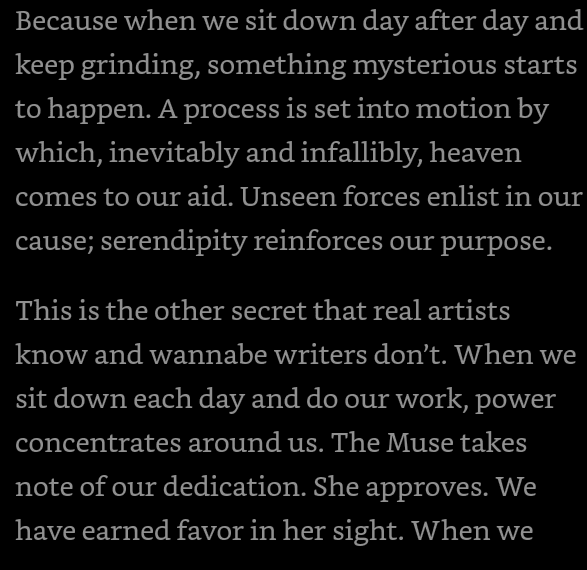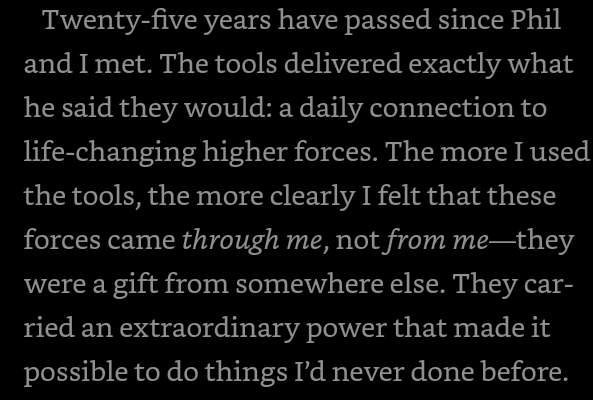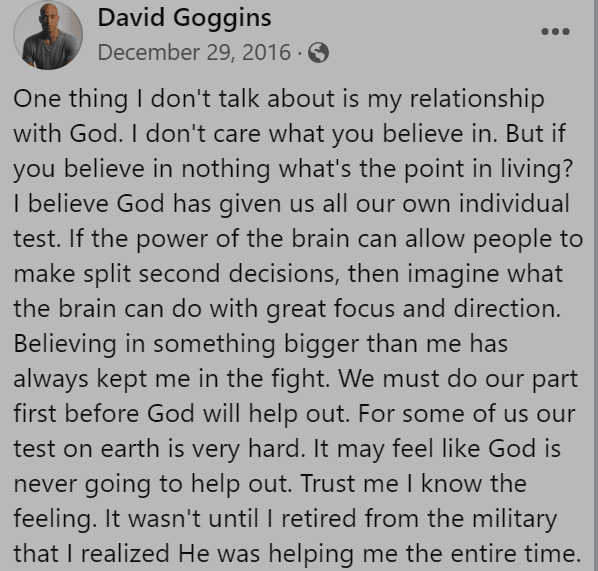Surprising thing I’ve found as I begin to study and integrate skillful coercive motivation is the centrality of belief in providence and faith of this way of motivating yourself. Here are some central examples: the first from War of Art, the second from The Tools, the third from David Goggins. these aren’t cherry picked (this is a whole section of War of Art and a whole chapter of The Tools).
This has interesting implications given that as a society (at least in america) we’ve historically been motivated by this type of masculine, apollonian motivation—but have increasingly let go of faith in higher powers as a tenet of our central religion, secular humanism.This means the core motivation that drives us to build, create, transcend our nature… is running on fumes. We are motivated by gratitude, w/o sense of to what or whom we should be grateful, told to follow our calling w/o a since of who is calling.
We’ve tried to hide this contradiction. our seminaries separate our twin Religion (Secular Humanism and Scientific Materialism) into stem and humanities tracks to hide that what motivates The Humanities to create is invalidated by the philosophy that allows STEM o discover. But this is crumbling, the cold philosophy of scientific materialism is eroding the shaky foundations that allow secular humanists to connect to these higher forces—this is one of the drivers of the meaning the crisis.
I don’t really see any way we can make it through the challenges we’re facing with these powerful new technologies w/o a new religion that connects us to the mystical truly wise core that allows us to be motivated towards what’s good and true. This is exactly what Marc Gafni is trying to do with Cosmo-Erotic Humanism, and what Monastic Academy is trying to do with a new, mystical form of dataism—but both these projects are moonshots to massively change the direction of culture.
We need a research on whether atheists are more likely to suffer from akrasia.
If we take Julian Jaynes seriously, the human brain has a rational hemisphere and a motivating hemisphere. Religion connects these hemispheres, allowing them to work in synergy. Skepticism seems to split them.
Effective atheists are probably the ones who despite being atheists still believe in some kind of “higher power”, such as fate or destiny or the spirit of history or some bullshit like that. Probably still activates the motivating hemisphere to some degree, only now instead of hearing a clear voice, only some nonverbal guidance is provided. Deep atheism probably silences the motivating hemisphere completely.
The question is, how to harness the power of the religious hemisphere without being religious (or believing some nominally non-religious bullshit). How to be fully rational and fully motivated at the same time.
Can we say something like “I know this is pure bullshit, but God please give me the power to accomplish my goals and smite my enemies!” and actually mean it? Is this what will unleash the true era of rationalist world optimization?
I do think it has some of that feeling to me, yeah. I had to re-read the entire thing 3 or 4 times to understand what it meant. My best guesses as to why:
I felt whiplashed on transitions like “be motivated towards what’s good and true. This is exactly what Marc Gafni is trying to do with Cosmo-Erotic Humanism”, since I don’t know him or that type of Humanism, but the sentence structure suggests to me that I am expected to know these.
A possible rewrite could perhaps be “There are two projects I know of that aim to create a belief system that works with, instead of against, technology. The first is Marc Gafni; he calls his ‘Cosmo-Erotic Humanism’…”
There are some places I feel a colon would be better than a comma. Though I’m not sure how important these are, it would help slow down the pace of the writing:
“increasingly let go of faith in higher powers as a tenet of our central religion: secular humanism.”
“But this is crumbling: the cold philosophy”
While minor punctuation differences like this are usually not too important, the way you wrote gives me a sense of, like, too much happening too fast: “wow, this is a ton of information delivered extremely quickly, and I don’t know what appolonian means, I don’t know who Gafni is, or what dataism is…”
So maybe slowing down the pace with stronger punctuation like colons is more important than it would otherwise be?
Also, phrases like “our central religion is secular humanism” and “mystical true wise core” read as very Woo. I can see where both are coming from, but I’ve read a lot of Woo, but I think many readers would bounce off these phrases. They can still be communicated, but perhaps something like “in place of religion, many have turned to Secular Humanism. Secular humanism says that X, Y, Z, but has no concept of a higher power. That means the core motivation that…”
(To be honest I’ve forgotten what secular humanism is, so this was another phrase that added to my feeling of everything moving too fast, and me being lost).
There are some typos too.
So maybe I’d advise making the overall piece of writing slower, by giving more set-up each time you introduce a term readers are likely to be unfamiliar with. On the other hand, that’s a hassle, and probably annoying to do in every note, if you write on this topic often. But it’s the best I’ve got!
Surprising thing I’ve found as I begin to study and integrate skillful coercive motivation is the centrality of belief in providence and faith of this way of motivating yourself. Here are some central examples: the first from War of Art, the second from The Tools, the third from David Goggins. these aren’t cherry picked (this is a whole section of War of Art and a whole chapter of The Tools).



This has interesting implications given that as a society (at least in america) we’ve historically been motivated by this type of masculine, apollonian motivation—but have increasingly let go of faith in higher powers as a tenet of our central religion, secular humanism.This means the core motivation that drives us to build, create, transcend our nature… is running on fumes. We are motivated by gratitude, w/o sense of to what or whom we should be grateful, told to follow our calling w/o a since of who is calling.
We’ve tried to hide this contradiction. our seminaries separate our twin Religion (Secular Humanism and Scientific Materialism) into stem and humanities tracks to hide that what motivates The Humanities to create is invalidated by the philosophy that allows STEM o discover. But this is crumbling, the cold philosophy of scientific materialism is eroding the shaky foundations that allow secular humanists to connect to these higher forces—this is one of the drivers of the meaning the crisis.
I don’t really see any way we can make it through the challenges we’re facing with these powerful new technologies w/o a new religion that connects us to the mystical truly wise core that allows us to be motivated towards what’s good and true. This is exactly what Marc Gafni is trying to do with Cosmo-Erotic Humanism, and what Monastic Academy is trying to do with a new, mystical form of dataism—but both these projects are moonshots to massively change the direction of culture.
We need a research on whether atheists are more likely to suffer from akrasia.
If we take Julian Jaynes seriously, the human brain has a rational hemisphere and a motivating hemisphere. Religion connects these hemispheres, allowing them to work in synergy. Skepticism seems to split them.
Effective atheists are probably the ones who despite being atheists still believe in some kind of “higher power”, such as fate or destiny or the spirit of history or some bullshit like that. Probably still activates the motivating hemisphere to some degree, only now instead of hearing a clear voice, only some nonverbal guidance is provided. Deep atheism probably silences the motivating hemisphere completely.
The question is, how to harness the power of the religious hemisphere without being religious (or believing some nominally non-religious bullshit). How to be fully rational and fully motivated at the same time.
Can we say something like “I know this is pure bullshit, but God please give me the power to accomplish my goals and smite my enemies!” and actually mean it? Is this what will unleash the true era of rationalist world optimization?
Request for feedback: Do I sound like a raving lunatic above?
I do think it has some of that feeling to me, yeah. I had to re-read the entire thing 3 or 4 times to understand what it meant. My best guesses as to why:
I felt whiplashed on transitions like “be motivated towards what’s good and true. This is exactly what Marc Gafni is trying to do with Cosmo-Erotic Humanism”, since I don’t know him or that type of Humanism, but the sentence structure suggests to me that I am expected to know these. A possible rewrite could perhaps be “There are two projects I know of that aim to create a belief system that works with, instead of against, technology. The first is Marc Gafni; he calls his ‘Cosmo-Erotic Humanism’…”
There are some places I feel a colon would be better than a comma. Though I’m not sure how important these are, it would help slow down the pace of the writing:
“increasingly let go of faith in higher powers as a tenet of our central religion: secular humanism.” “But this is crumbling: the cold philosophy”
While minor punctuation differences like this are usually not too important, the way you wrote gives me a sense of, like, too much happening too fast: “wow, this is a ton of information delivered extremely quickly, and I don’t know what appolonian means, I don’t know who Gafni is, or what dataism is…” So maybe slowing down the pace with stronger punctuation like colons is more important than it would otherwise be?
Also, phrases like “our central religion is secular humanism” and “mystical true wise core” read as very Woo. I can see where both are coming from, but I’ve read a lot of Woo, but I think many readers would bounce off these phrases. They can still be communicated, but perhaps something like “in place of religion, many have turned to Secular Humanism. Secular humanism says that X, Y, Z, but has no concept of a higher power. That means the core motivation that…”
(To be honest I’ve forgotten what secular humanism is, so this was another phrase that added to my feeling of everything moving too fast, and me being lost).
There are some typos too.
So maybe I’d advise making the overall piece of writing slower, by giving more set-up each time you introduce a term readers are likely to be unfamiliar with. On the other hand, that’s a hassle, and probably annoying to do in every note, if you write on this topic often. But it’s the best I’ve got!
Thanks. Appreciate this. I’m going to give another shot at writing this